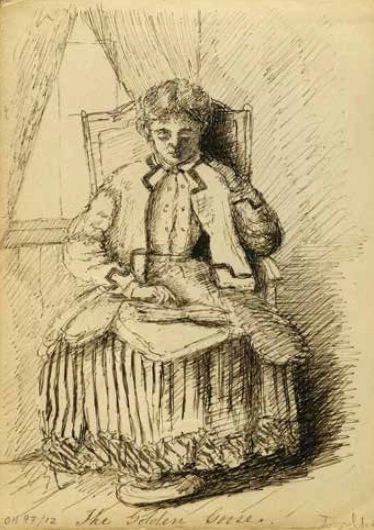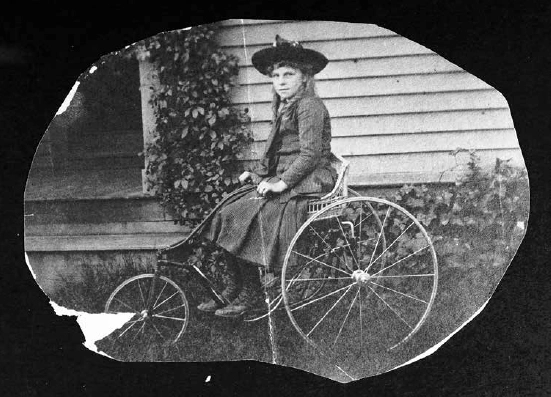(Louisa May Alcott Memorial Association)
But Alcott’s success brought pleasant times as well. In 1870, having just completed another best seller, An Old-Fashioned Girl, Alcott took a second tour of western Europe, this time in the company of her sister May and family friend Alice Bartlett. She spent the late fall and early winter of 1875–76 in luxurious surroundings in New York, relishing a swirl of “clubs, dinner receptions, galleries & theatres.”98 But even as she reaped her rewards, her obligations, real and imagined, continued to dog her. Alcott could not enjoy her travels to New York without writing “a few tales . . . to pay my way.”99 During her European tour with May, the disruption of her pleasures was far more dramatic. Not long after the traveling party had settled in for a winter in Rome, dreadful news arrived from Concord: Anna’s husband, John, only thirty-seven, had died suddenly. Alcott’s extended vacation at once transformed into a working holiday. So that Anna and her two children would not be left in want, she set to work on Little Men, the first sequel to Little Women. Again, her pace was remarkable. The book, which she had not even conceived before December 1870, was published in England on May 15, 1871.

May Alcott made this sketch of Louisa writing during their 1870–71 European tour. Alcott wrote from abroad, “May was in heaven and kept having raptures over the gables, the turrets with storks on them, the fountains, people and churches” (Louisa May Alcott, Journals, p. 130). (Louisa May Alcott Memorial Association)
Alcott swore to become “a father” to her nephews.100 She did much to honor that pledge, including putting on plays with them and teaching them to play “Pilgrim’s Progress” as she had done as a child. Her care of Freddie and Johnny Pratt was but one of the familial roles that Alcott played. Indeed, it is hard to think of a position in the Alcott family she did not assume, especially when someone else proved unable to fulfill it. She was, of course, the family’s principal wage earner for decades. After Lizzie, “the angel of the house,” passed away, it was Louisa who assumed the mantle of caring for her aging parents. When she went to war, her father observed that he was sending his only “son” to war. In the case of Johnny Pratt, Alcott’s surrogate fatherhood eventually transmuted into legal parenthood; in 1887, she formally adopted her nephew, who thereupon changed his name to Alcott, so that he might renew her copyrights after her death.
The need for Alcott to fill every conceivable function in her family grew ever stronger as age and death gradually wore away at the little group. Bronson, buoyed by his vegetarian diet and the resurgence in his career that began with Tablets, remained in robust health, “busy and bright as a boy” into his eighties.101 Abba was not so fortunate. Two years before Little Women, the real-life Marmee was already looking old and tired, showing “every sign of age.”102 Over time, Louisa came to accept that Abba was “never to be our brave, energetic leader any more.”103 In the early and mid-1870s, Alcott unstintingly spent both time and money to see to her mother’s needs. While her family obligations seemed only to multiply, Alcott’s literary output never slackened. In addition to An Old-Fashioned Girl and Little Men, the decade that followed Little Women saw the publication of Eight Cousins (1875), Rose in Bloom (1876), and Under the Lilacs (1878). In addition to those books for younger readers, she also produced a deeply thoughtful novel for adults that she called Work (1873), and the scintillating novella A Modern Mephistopheles (1877). During this period and beyond, she also supplied periodicals like St. Nicholas and The Youth’s Companion with a steady stream of stories, which she later published in bound collections like Silver Pitchers (1875), Spinning-Wheel Stories (1884), A Garland for Girls (1887), and the six-volume series Aunt Jo’s Scrap-Bag (1872–82). In her fleeting spare time, Alcott agitated for women’s suffrage. In 1879, when the Massachusetts legislature deigned to grant women the vote in school-board elections, Alcott became the first woman in Concord to register as a voter. Alcott had hoped that that honor might be claimed by her mother, but the change in the law came too late. Worn out from long years of toil, but profoundly grateful that her daughter had made her declining years happy and comfortable, Abba Alcott had died four days before Louisa’s birthday in November 1877.

After May Alcott died in 1879, her infant daughter Louisa May Nieriker (1879–1975) became Louisa’s ward.
1 comment